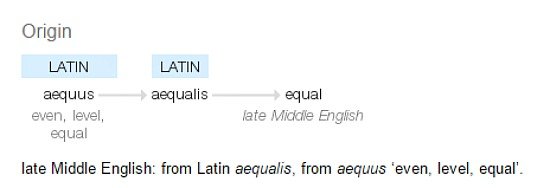
Equal and Different
A common misunderstanding about what Christian egalitarians believe concerns the words “equal” and “equality”. When egalitarians use the word “equal” it does not mean that we think people are, or should be, all exactly the same or identical. We can see that men and women have some differences, and that men and women complement each other. Egalitarians are not about ignoring, or erasing, the differences between men and women. Rather we are about valuing the talents, gifts, and capabilities of individuals, most of which are not tied to gender.
Equal, Level, Even
The English word for “equal” comes from the Latin word aequalis which, as well as meaning “equal”, also means “level” and “even”. Christian egalitarians use the word “equal” because we see that there is a “level playing field” in Jesus’ kingdom. Jesus taught that in his kingdom, the humble are exalted, the lowly are the greatest, and the last are first. In other words, there is a levelling where we each have the same status, the same rights, and, potentially, the same opportunities.

This “level playing field” is free from hierarchies, castes, cliques, and other artificial social distinctions which favour some and discriminate against others—distinctions brought about by various prejudices such as snobbery, misogyny, racism, and even personal preferences. The “level playing field” of the kingdom of Jesus it is open to anyone and everyone who decides to follow Jesus, join in, and use their abilities to worship God and serve people. Ideally this “level playing field”, as well as being evident in the church, also applies in marriage.
Paul and Equality
The apostle Paul alluded to a “level playing field” when he wrote Galatians 3:28: “There is neither Jew nor Greek, there is neither slave nor free, there is no male and female, for you are all one in Christ Jesus.” Some Christians think that Paul’s statement here is simply a theological statement that has no bearing on our present society or relationships within the community of God’s people. Yet Paul listed social categories in Galatians 3:28 that encompassed the society of his day.
Paul tells his audience in Galatians 3:26-28 that when someone comes to faith in Jesus Christ they take on a new identity: they become a son of God. And when that person is clothed with Jesus Christ in baptism, their new identity overrides the social distinctions that pigeon-hole and divide sectors of society. It is our new identity in Christ that unites us; so it is difficult to see how some Christians honestly believe that our new identity has no bearing on relationships and society (cf. 2 Cor. 5:16-17). It does.
Sameness and Gender Roles
While Egalitarians have occasionally been wrongly accused of ignoring the differences between women and men, there are Christians who ignore the differences among women and the differences among men. These Christians prescribe fixed gender roles which do not take into account the diversity and complexity seen among individuals of both sexes.
Not all women are the same. Not all men are the same. Prescribing rigid gender roles, and saying that all men are leaders and all women are submissive followers—a view held by hierarchical complementarians—is surely ignoring the fact that some men have little to no leadership ability, and some women are excellent leaders.
The view of hierarchical complementarians also ignores the fact that, as Dale Fincher has put it, “Leadership is a fluid and seasonal role you play depending on your responsibility in the moment and the larger task at hand.” Furthermore, complementarianism largely ignores Paul’s directive that Christians are to be mutually submissive to one another (Eph. 5:21 ).
Conclusion
Christian Egalitarians do not advocate for sameness, and we do not ignore difference. Rather, we are about allowing and encouraging individuals to use their different abilities to help resource and further the church’s mission. We believe that our God-given gifts and abilities trump the social distinctions of race, gender, and class, when it comes to working out who does what in marriage, in the church, and in broader society, at any given point in time.
While men and women have many more similarities than differences, Christian Egalitarians simply do not think all people are the same or should be the same.
© March 3rd 2016, Margaret Mowczko
This article first appeared at newlife.id.au here.

Fantastic way of putting this out there, Marg. So many people get confused about what it is to be an egalitarian, yet, we would find that if people could grasp it, as you’ve written here, there are far more people who agree on egalitarian principles than is immediately obvious. thanks again for your scholarship.